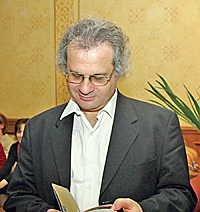The latest work by Amin Maalouf, the Lebanese writer who lives in Paris, is “Origines.” The book analyzes the relationship between Maalouf’s grandfather and his great uncle. Both Lebanese, his grandfather remained in Lebanon while his great uncle went to seek his fortune in Cuba.
After discovering letters and poems in an old trunk, Maalouf decided to use the material and write the story of a Lebanese family over a number of years. The life of the characters emerges and enlightens the author in his search for his own roots. The correspondence is informed by brotherly love and a shared cultural heritage. The book reaffirms Maalouf’s strongest convictions that are the rejection of intolerance, fanaticism and ignorance.
Why did you decide to write about your family?
A tradition of silence and a sense of decency restrained me but I always thought that one day I would write a book about my family. The one who went abroad and the one who remained at home.
What triggered me to start was meeting a friend who is a diplomat who told me he had met a man in Cuba with the same surname as mine. A few months later, my mother brought me three letters by my Cuban great-uncle.
In my childhood, I had of course heard of the uncle who went to make his fortune in Cuba and of my grandfather who at first followed him but then returned. My grandfather, Boutros, was a well-read man and when I read what he had written, I decided to satisfy his wish of being recognized and published. In a way, I feel he forced my hand but it was time for me to plunge into my family history.
Is “Origines” a continuation of some of your other work?
There is a similarity between it and my previous books. One of the earlier ones dealt with life in the mountains of Lebanon and it was inspired by many of families’ tales and stories. While ”Origines” is not a novel, it belongs to the same genre.
In “Origines” what interests you is your family. Why?
For me identity is composed of many elements. A person must be able to assume all the elements of his or her identity; that was the idea I developed in earlier work. Today I have tried to deal with some of these elements. They are related to my family but they are only one part. I have not developed all the aspects but I will one day. In “Origines” I tell the story of some of my ancestors who meant a great deal to me and who left documents that told me their story.
It is true that other people have counted in my life and I would also like to write about them one day.
Is the book a way of paying tribute to the modern and tolerant man who was your grandfather at a time when few people had such open minds?
My grandfather was somewhat of a rebel and certainly very modern in his outlook. He dreamed of modernizing the countries of the east without copying those of the West. He was persuaded that the East had its own way of evolving in all fields including democracy, freedom and women’s rights.
What about the disappointment your grandfather felt?
Indeed by describing his disappointment in his time, I also describe mine today. I always dreamed of creating in my writing a bridge between East and West. There is now confrontation between the two, which I formerly believed avoidable. The prospects of a conflict between the two sadden me.
Does your Lebanese origin influence your wish to create bridges between cultures?
If you lived in Lebanon, one of your first realizations is the necessity for coexistence. Lebanon has constantly tried to find solutions leading to harmony and peace between communities. This is what I try to do, hoping that the future will be better than the present.
You have been a journalist and have lived in France for many years but you remain faithful to your Lebanese roots. Do you feel concerned by what is happening in the Middle East?
In fact I am still a journalist deep inside but now a passive one. I am deeply interested by what happens in the Middle East as well as in other parts in the world. I read all kinds of news, on the Internet in particular and I am happy to have the possibility that none of us had before. I’m interested by all that is happening but I don’t feel the need to intervene.
Is writing in French a way of creating bridges? And why do you choose to express yourself in French?
I feel that I am at the meeting point of several cultural traditions. Like many Lebanese I speak three languages: Arabic, French and English and each is important to me. I write more easily in Arabic and French. In the beginning, I wrote mostly in Arabic and then I started in French. My parents sent me to a Frenchmedium Jesuit school so French was the language of my education and I am comfortable using it. If I had stayed in Lebanon, I would have certainly written in Arabic but when I came to France, French became the language of my everyday life and the one in which I can express my most personal feelings.


